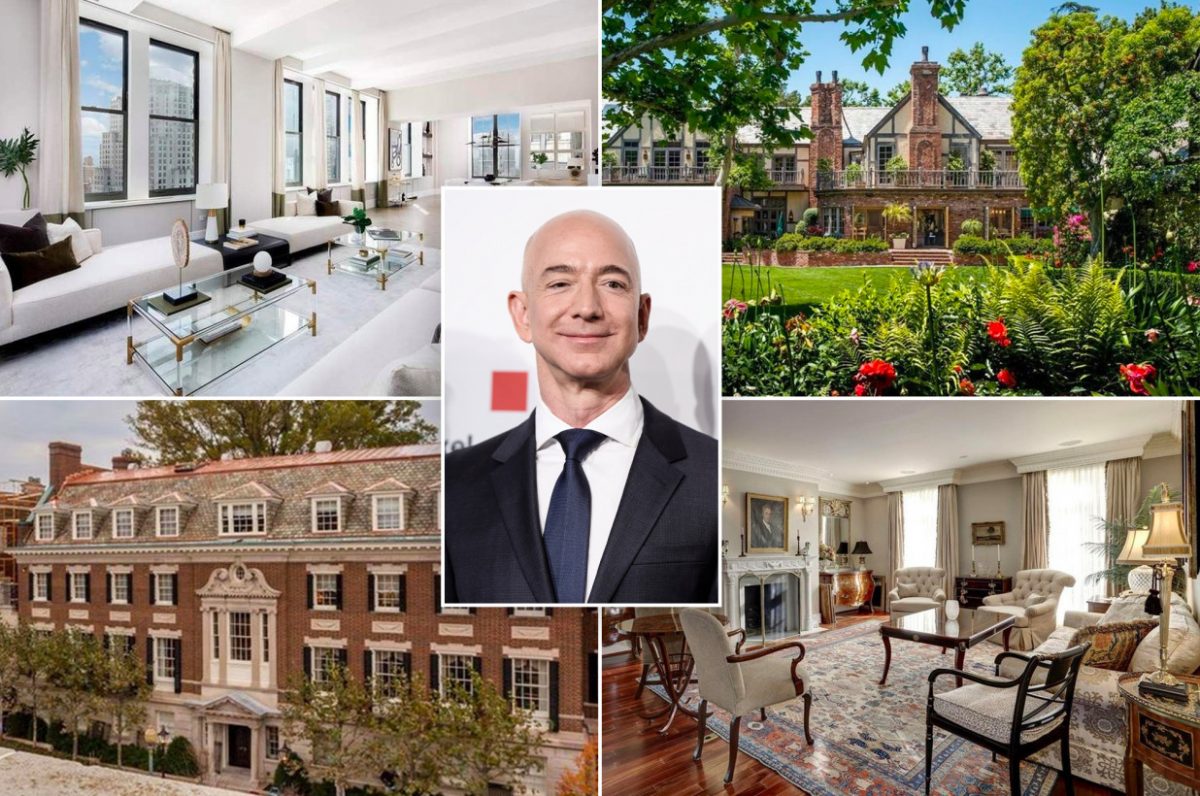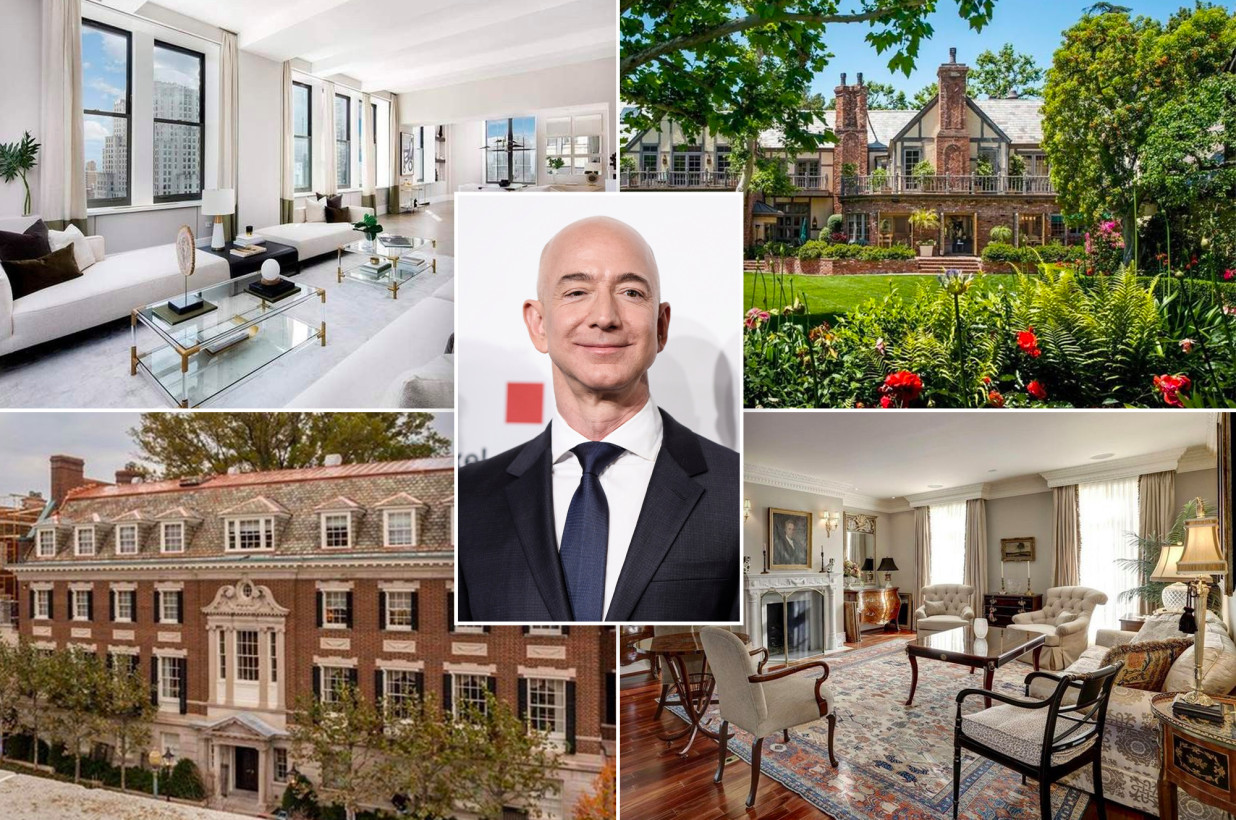The Daily Ten – Jeff Bezos’ $500 million real estate portfolio, How Billionaire Robert Smith Avoided Indictment in a Multimillion-Dollar Tax Case…

The Daily Ten
1. Jeff Bezos’ $500M real estate portfolio: See all his luxury houses | New York Post
It’s the end of an era for Jeff Bezos, who announced that his time as the CEO of Amazon would soon come to a close.
Starting out in 1994 as an online bookstore, Amazon morphed into a multi-trillion-dollar company with Bezos, 57, as the ring leader of it all. Since, he has amassed a gigantic real estate portfolio worth upwards of $500 million, accounting for inflation. Ranging from properties in Beverly Hills to Seattle to good ole’ West Texas, and even cities like Washington, D.C., and New York City, Bezos has a home for each climate.
2.The Latest Hotel Perk for Overseas Travelers: Covid Testing | WSJ
Hotels and other businesses that draw U.S. tourists abroad are scrambling to make testing for the virus as easy as possible
Hotels are scrambling. Airports are strategizing. Airlines are creating new apps.
Travel companies are rushing to make Covid-19 testing a regular part of international travel—as easy as checking a bag—to stem cancellations and get travelers traveling again.
A Centers for Disease Control and Prevention order that requires anyone entering the U.S. to have a Covid-19 test within 72 hours of boarding triggered a massive travel-industry effort to make it easy for guests and passengers to comply. PCR tests and rapid antigen tests satisfy the requirement; rapid antibody tests don’t.
3. Cadre launches fund targeting small real estate investors | The Real Deal
$400M fund will bring in investors for as little as $5K
Real estate investing firm Cadre is making good on its previous promise to start a real estate fund targeting opportunities brought on by the coronavirus pandemic.
The company is launching a new $400 million fund that’s meant to make it easier for individual investors, financial advisors and institutions to invest in real estate, according to Forbes.
“I believe we are entering a period that will potentially be a once in a lifetime opportunity to invest in attractively-priced properties,” Ryan Williams, the company’s founder and CEO, told the publication.
Investors in Cadre’s Direct Access Fund must be qualified, but if they meet the conditions, they can buy in with minimum per-property checks of as low as $5,000. Since its 2014 founding, the company has distributed more than $168 million to its investors.
4. How Billionaire Robert Smith Avoided Indictment in a Multimillion-Dollar Tax Case | Bloomberg
How Vista Equity Partners’ boss parlayed connections, charity and cooperation to win a non-prosecution agreement from the Justice Department.
U.S. prosecutors and Internal Revenue Service agents spent four years piercing the veil of secrecy that billionaire money manager Robert F. Smith wove to hide more than $200 million in income. Last year, according to people familiar with the matter, a team led by the Justice Department’s top tax prosecutor argued to then-Attorney General William Barr that the evidence warranted indicting Smith, who had made headlines for pledging to pay the student debt of a Morehouse College graduating class.
But rather than expose a man worth about $7 billion to a possible prison term and potentially force him to give up control of his private equity firm, Vista Equity Partners, Barr signed off on a non-prosecution agreement. It required Smith to admit he had committed crimes, pay $139 million and cooperate against a close business associate indicted in the largest tax-evasion case in U.S. history—Texas software mogul Robert T. Brockman.
5. Manhattan Apartment Buyers Come Back After Almost a Year Away | Bloomberg
Home shoppers are finally coming around in Manhattan.
New York City’s costliest borough — ignored by buyers for much of last year while sales surged in Brooklyn and the suburbs — saw purchase contracts for co-ops and condos double in January from the same month in 2020, appraiser Miller Samuel Inc. and brokerage Douglas Elliman Real Estate said in a reportThursday.
It was the second straight month in which deals topped pre-pandemic levels, but January’s increase was larger by far.
6. McKinsey to pay $573 million in settlement resolving claims about its role in the opioid epidemic | CNBC
Consulting firm McKinsey & Co has agreed to pay at least $573 million to resolve claims by 40-plus U.S. states related to its role in the opioid epidemic and advice it gave to OxyContin maker Purdue Pharma, according to a person familiar with the matter.
The settlement is with 43 states, the District of Columbia and three territories, the person said on Wednesday. Several attorneys general said they planned announcements on the opioid epidemic on Thursday.
They included Vermont’s attorney general, T.J. Donovan, whose office said it would announce its participation in the first multi-state opioid settlement “to result in substantial payment to the states to address the epidemic.”
7. China’s national blockchain network embraces global developers | TechCrunch
While China bans cryptocurrency exchanges and initial coin offerings, the government is set to leverage the underpinning technology — often without the decentralized part. Blockchain, for instance, could help track the shipment of luxury goods and authenticate court evidence. In the process of adopting blockchain applications in its own interest, China also wants to become a world leader of the new technology.
Last year, an ambitious, government-backed blockchain infrastructure networklaunched in China. The Blockchain-based Service Network, or BSN, acts as an operating system for blockchain programs so developers won’t have to design a framework from the ground up. Importantly, it’s part of the country’s goal to set industry standards and build the underlying infrastructure for blockchain applications worldwide.
8. ManoMano’s sales are growing rapidly for its home improvement e-commerce platform | TechCrunch
It’s been a year since I covered ManoMano, the French e-commerce platform focused on DIY, home improvement and gardening products. And 2020 has been a successful years as the company’s gross merchandise volume doubled to €1.2 billion ($1.45 billion at today’s rate).
ManoMano’s sales are also accelerating as the company reported a 50% increase in 2019 gross merchandise volume compared to 2018.
When it comes to “softer” metrics, the company now attracts 50 million unique visitors per month, which represents a 70% year-over-year increase. There are 7 million active clients on the platform — that’s a 100% increase.
9. PGIM buys into Taronga’s proptech play | Financial Review
One of the world’s largest real estate fund managers, New York-based PGIM Real Estate, has taken an equity stake in innovation investor Taronga Ventures and committed capital to a major raising in the local player’s proptech fund.
The contribution to Taronga’s RealTech Ventures Fund, which is targeting a $100 million raising, brings the New York house alongside investors including global real estate firm CBRE and Frankfurt-listed real estate investment manager Patrizia, which have already invested in the vehicle, as well as locally listed Dexus, Australia’s largest office landlord.
10. In the Minneapolis real estate market, COVID-19 has caused mixed results | Kare 11 News
Some areas, like the North Loop and Mill District, have seen median sales prices increase. But properties closer to the heart of downtown have struggled.
During the pandemic, the streets of Minneapolis have sometimes felt desolate.
But the housing market remains competitive.
“Very competitive,” Bill Barton said, while on a walk to visit his daughter near the Stone Arch Bridge.
Barton knows from experience. He told KARE 11 his daughter has been searching for an entire year to purchase her first home in Minneapolis, but she’s finding it very difficult to keep pace.
“She’s looking for a $250,000-range house,” Barton said, “and every one she bids on, she gets outbid.”
Barton’s story about his daughter highlights the complexities of the real estate market in the Twin Cities, which has been impacted prominently by COVID-19, and perhaps also by civil unrest and overall rising violent crime. It seems to depend on the property and the neighborhood; it’s not all good news, and not all bad news.
In short, the outlook seems mixed.


